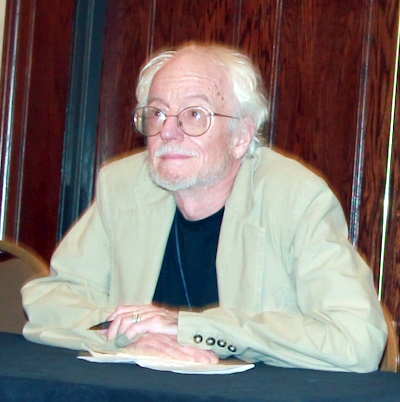4 people attended a Center For Inquiry book group discussion of James Morrow "Towing Jehovah". 3 of them liked it, one not so much.
Unexpectedly to myself, I liked this novel very much. This book was first recommended to me by a guy in the Atheist Community of Austin. When he told me about the book's premise -- God dies, falls to Earth, and his 2-mile-long body needs to be towed -- I thought it was absurd. He said, yes, but it's very good and very funny.
I am cautious of stories based on absurd premises. Too often they are simply incoherent, as if the author thought that absurdity alone makes a story funny, or that it is a good substitution for satire. This wasn't the case with "Towing Jehovah". Even though the premise patently doesn't make sense to either atheists or believers (only a vanishingly small minority of the latter believe that God has a physical body), the plot develops completely logically, and all of the major characters behave rationally in the bizarre circumstances. When I picked it up, little did I know how much I will enjoy it.
Lots of funny ideas
But not everybody in the CFI book club thought this book was great. One reader felt that while "Towing Jehovah" had a few funny ideas, it "didn't jell". There were plenty of comical moments, like the Pope watching big screen videos of Bing Crosby; or the whole subplot with World War II re-enactors. Or the scenes that give us an appreciation of how humongous God's body was. The mechanics of attaching chains to the eardrums in order to tow the body. Or driving the Jeep into God's bellybutton. Or individual hairs thick enough to tie things to. Or being underwater and swimming into a divine ear with scuba gear. (I would say those scenes were extremely gross, and just as fascinating. Overall, this book does not shy from the gross. It examines it in loving detail, even. If you think an up-close scrutiny of pores the size of moon craters is repulsive, just wait to see what happens when the ship gets stuck on the shallows near the coast of an uninhabited island.)
Some characters' motivations were hard to understand
So overall, one reader thought "Towing Jehovah" had lots of interesting little ideas, but overall didn't quite jell. "In the end," he said, "I was wondering, what was it all about"? He also did not quite buy Cassie and Oliver's reasons for wanting to destroy God's body. Cassie supposedly wanted to get rid of it because, as an arch-feminist, she was afraid that a discovery of God's body by the general public would plunge the world into the new Dark Ages. This reasoning sounded somewhat flimsy to this reader. If God was dead, wouldn't it be logical to show it to the world, so that they would know they were wrong in their belief? The ironic thing is, a discovery of a dead god did not serve either Christians or atheists. The former would find out they were right before, because God really did exist, but they are wrong now; the latter would be right, but not for reasons they thought.

James Morrow at ArmadilloCon 2015, a speculative fiction convention in Austin, TexasA reader also noted that the lighthearted farcical tone of the book was inconsistent with certain tragic moments scattered throughout the book, where people die or getting seriously injured in ways that are not funny at all.
Satire equally directed towards believers and non-believers
Other people enjoyed the satire in the book. They appreciated that it was directed not just towards religion, but towards atheism in equal measure. Readers recognized some aspects of groups like CFI in the fictional Enlightenment League, and admitted that the barbs pointed at it were pretty accurate. "Despite having a lot of money, the Enlightenment League is pretty ineffective, and what they mostly do is pranks, silly stuff", a reader said.
An interesting dialogue between those groups
While this book is written from an atheist perspective, it is notable that the author does not side with militant atheists. Rather, he lets the three main characters -- the Jesuit priest, the religion-neutral captain, and the atheist Cassie -- have a conversation about God and related matters. One reader said their discussions were one of the enjoyable points of the book. "I thought the priest was interesting, reasonable, the professor. And the captain was interesting too. To me he represented the moderate middle. He wasn't willing to say the didn't believe in God, but he wasn't religious by any means. And then the atheist coming in... I liked the interplay between these 3 individuals, and the way they discussed their beliefs, and that it didn't degrade into awful fighting," she said.
Sympathetic characters and a humanist message
The protagonist, captain Van Horn, who was commissioned to tow the God's body, is probably the most sympathetic character of the book. He has his own deeply felt reasons for wanting to deliver the God's body to its final resting place in the Arctic. They originate in his unfulfilling relationship with his father, a relationship he is still trying and failing to heal. Too many works of satire have left me feeling empty, because there weren't any characters to root for, but this clearly isn't the case here: there are several characters one can easily identify with.
This novel does an excellent job of delivering a humanist message. I really like how it demonstrates the point that whether God existed or not, the civilization would be no different. In the absence of a basis for religion, society is held together by human social and moral norms, which remain the same. The ship crew's brief experiment with giving up those norms ends as a disaster to all of them, and the social order is restored by people's need to cooperate for the sake of their own survival.





